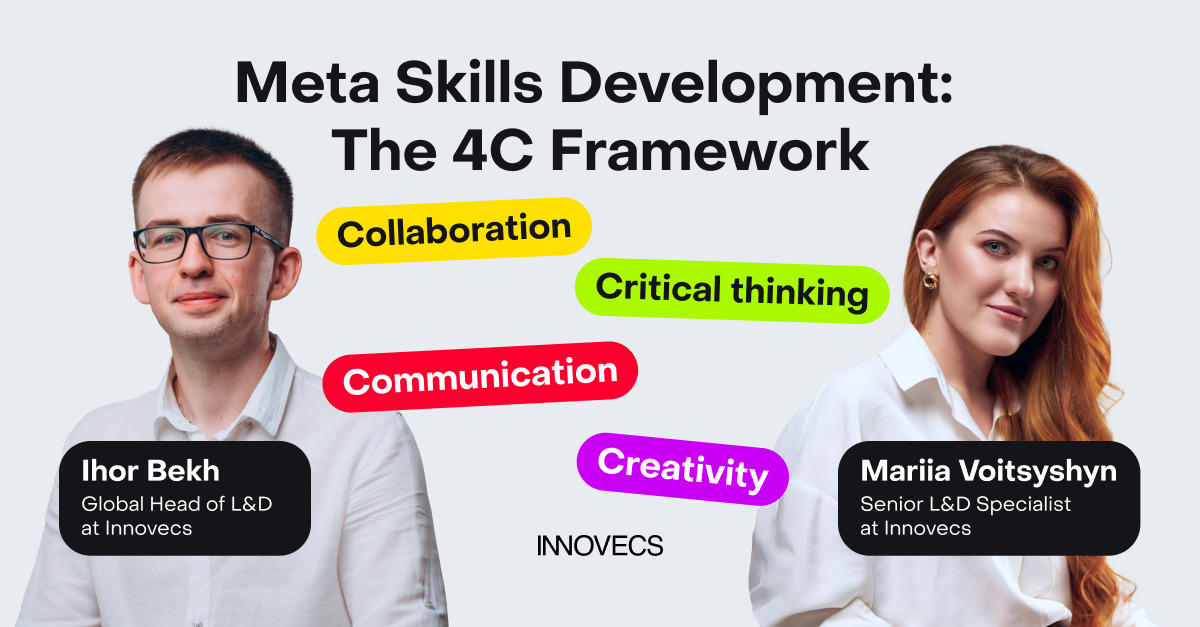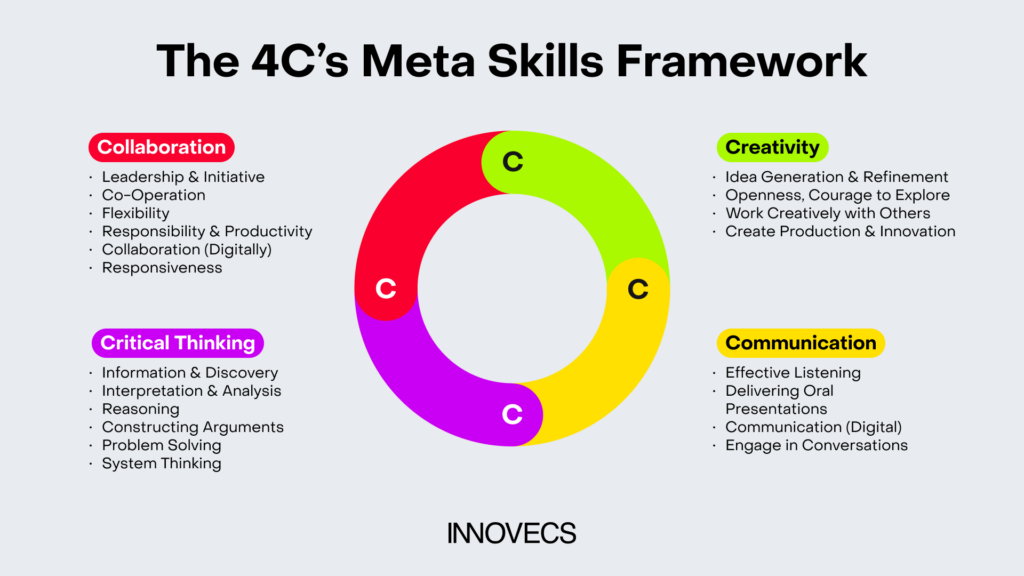
Professional growth in today’s fast-paced world hinges on the development of meta skills.
Research from Harvard University, the Carnegie Foundation, and Stanford Research Center highlights those hard skills, like technical expertise, contribute only 15% to career success. The rest depends on soft, adaptable skills — meta skills — that allow professionals to learn, innovate, and thrive.
At Innovecs, we’ve introduced the 4C framework — Communication, Collaboration, Creativity, and Critical Thinking — as the foundation for our quarterly Open Classes. Through focused sessions, we aimed to help our team develop these higher-order skills to navigate challenges, solve complex problems, and succeed both professionally and personally.
We spoke to Ihor Bekh, Global Head of L&D and Mariia Voitsyshyn, Senior Learning & Development Specialist to learn more about this initiative, its structure, and why meta skills are a must for the future.
Since 2019, the development of 4C skills has become an integral part of our approach to developing engineers, whether in preparing young talent through Innocamp (Internship and Juniorship programs) or experienced developers, UI/UX designers, QA specialists, and project managers at Innovecs. We focused on these four meta-skills because they are higher-order skills that enhance a person’s ability to learn and apply new knowledge quickly. This is particularly relevant in an era of disruptive innovations and the advancement of AI technologies.
When planning professional development at Innovecs, we create individual development plans focused on three skill groups: soft skills, tech skills, and business skills. Our approach to professional development prioritizes soft skills because, according to research by Harvard University, the Carnegie Foundation, and Stanford Research Center, 85% of workplace success is achieved through well-developed interpersonal skills (soft skills).
Meta skills shape a mindset that encourages leaders to continuously learn new things, solve problems, and develop additional complex competencies. As a result, leaders engage in lifelong learning and adapt to rapid changes in the world. Since leaders serve as role models for their teams, they are critical to the resilience of the business. Furthermore, the development of meta skills helps leaders manage themselves and their teams effectively, build strong relationships within their teams, foster a positive work environment in project offices, and openly embrace new ideas and technologies.

After Ihor provided a strategic perspective on how the 4C framework fosters lifelong learning, adaptability, and business success, Mariia offered a closer look on this foundation by explaining the practical side of the program. She detailed how the framework is structured to help participants develop these essential meta skills through focused sessions, creating a clear path for professional growth and problem-solving in a fast-paced world.
The inspiration for focusing on the 4C framework comes from research highlighting the importance of soft skills in career success. Studies from Harvard University, the Carnegie Foundation, and the Stanford Research Center found that hard skills, including technical knowledge, only account for about 15% of career success. This means that while technical skills are important, they aren’t enough. To truly excel, professionals must master soft skills like communication, collaboration, creativity, and critical thinking. These skills help individuals adapt to changing environments, work effectively in teams, solve complex problems, and make better decisions. Recognizing their importance, we decided to focus on the 4C framework for this workshop series to ensure participants develop the meta-skills that will set them apart.
Each quarter, we focused on one key competency and offered a structured approach that allowed participants to progressively develop their skills. We began with a webinar introducing the core concepts and theories of competency. This was followed by two practical workshops, during which speakers from our company shared their expertise and provided participants with opportunities to apply their new knowledge in real-life scenarios.
I recommend focusing on one skill at a time to integrate the 4Cs (communication, collaboration, creativity, and critical thinking) into daily work. Start with communication — be clear and ensure you’re practicing active listening. This will help build stronger relationships with colleagues and improve team efficiency. For collaboration, I suggest reading Patrick Lencioni’s “The Five Dysfunctions of a Team”. This book offers clear steps to address team challenges and improve overall teamwork. For creativity, challenge yourself to find new ways to solve problems, and don’t be afraid to experiment with different approaches. This will help you think outside the box and promote innovation in your work. Finally, for critical thinking, take the time to analyze situations deeply and reflect on your emotions before making decisions. With this approach, you will make better and more informed choices.
Practicing these skills regularly will gradually become part of your routine, helping you grow personally and professionally.
The 4C skills are key to business success because they help team members communicate better, work together effectively, think outside the box, and make smarter decisions.
Companies that support these skills create a more flexible and innovative work environment. Employees who are good at communication, collaboration, creativity, and critical thinking is better at solving problems and adapting to new challenges. Offering training in these areas helps teammates grow and strengthens the organization, which is vital for staying competitive and thriving in a fast-changing market.
Meta skills are no longer optional in today’s fast-evolving professional landscape — they are essential. The insights shared by Mariia and Ihor represent how the 4C framework empowers individuals and teams to meet the demands of the present.
By focusing on Communication, Collaboration, Creativity, and Critical Thinking, Innovecs is setting a benchmark for how companies can equip their talent with the tools needed to thrive in a world driven by innovation and change.
The journey to mastering meta skills is ongoing, and the 4C framework is your guide to staying ahead in a world that demands nothing less than your best.




